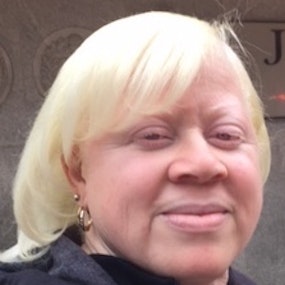

Join us for our latest episode where the talented Ms. Shelia Graham speaks on her years as an educator in the New York City Public School system, and explains the need for more community mentors in children's lives.

The Colors of Sound Podcast
Season 2, Episode 8
@ColemanGlobal
"What Role Does Mentorship Play in Education?"
WDON1204.com is proud to present our latest podcast, The Colors of Sound. Our mission is to create a safe space for community members from around the world to share their personal stories.
Join us for our latest episode where the talented Ms. Shelia Graham speaks on her years as an educator in the New York City Public School system, and explains the need for more community mentors in children's lives.
#TakeBackMonday, #Purpose, #Service, #Community, #People, #InnerCircle, #QuoteOfTheDay, #community-service, #bronx, #smallbusiness, #newyork, #black, #positivevibes, #learning, #workshop, #intergenerational, #podcasting, #LiveBrave, #intergenerationalprogramming, #technology, #LifeLearner, #ColemanGlobal
--- Send in a voice message: https://podcasters.spotify.com/pod/show/wdon1204/message Support this podcast: https://podcasters.spotify.com/pod/show/wdon1204/support
In a world where so many things are vying for your time, I just wanted to say, Thank You for your attention.
In Unity,
Timothy
Timothy Coleman (00:00.986)
WDON1204.com, community focused, globally connected. Find us online at Coleman Global. WDON is proud to present our latest podcast, The Colors of Sound. Our mission is to create a safe space for community members from around the world to share their personal stories. Listen on all streaming platforms or on our podcast station, WDON1204.com. The Colors of Sound podcast, discover how much we have in common.
Timothy Coleman (00:30.09)
So in the conversation of preparation, what are some of your thoughts around it?
how do we prepare? Like is there, you know, everybody seems different in how they get themselves ready to do whatever it is they're about to do. Is there a work smarter, not harder way to approach preparation for something? Oh, absolutely. Not only do you have to work smarter, not harder, but you also have to kind of have that foresight to see what could possibly be coming your way. And that's sometimes where we go wrong and we miss God, right?
as we talked about before, I had a degree in programming, computer programming with a minor business management. I was not prepared to be a teacher. I literally had to go back to college and get a master's degree in teaching, right? Before I felt like I was fully qualified to be in that position. And at the time, we also have state and national teaching tests that we had
Timothy Coleman (01:38.184)
and pass that to feel comfortable, right, in that role as teacher. And in your role as teacher, your learning doesn't stop. So I was constantly taking classes just to learn the next thing, whether it was around supporting students with special needs, whether it was around teaching kids new math skills and using new technology tools and new literacy programs that come out, right? You never stop learning in education.
Education because when you stop doing that you may as well stop teaching right because you're missing an opportunity to prepare yourself for that child that's coming through and Every year you get a new set of students in that classroom and they're not like last year's students And across over the generations and 34 years trust me I've seen the varying levels of children varying levels of teachers that have come in and We all need to be prepared for the that was sitting before us.
I was very good at technology and a lot of the teachers weren't so good at technology, right? So my school principal at this time decided that she would create this role where I would step out of the classroom and actually train teachers on how to use technology. So I felt like, okay, if I'm going to do this, I need to be even more prepared at it. It's not just the skills that I've learned by doing what I call sitting and fidgeting with tools, right?
see what's being taught in the classroom and college level and bring it back to our children in our elementary, middle, and high schools. So that I was prepared to work with teachers. I went back to school and I got a degree in district leadership and technology from the New York Institute of Technology. And after I did that, I was like, OK, this is good. I'm doing everything I needed to do with that degree.
Timothy Coleman (03:41.644)
about working with education here in the city, you know things change, right? Right. So there's always something new coming out and innovations are changing and tools are changing and your desire to do something new changes as well. So in thinking that, okay.
I need to focus more on my passion, which are little people, right? So how can I become better at supporting my little children and my teachers, right, and making sure that they are capable of providing the best education to the kids that sit before them? And that's when I decided to go back to Bank Street College of Education and get an early childhood leadership degree.
of these degrees were 10 to 11 to 12 years apart. Okay. So, so it's like, when you think about it, been out of school for 10 years, I don't want to go back to school. Right? And retrain your mind and get you something. But yeah, retrain your schedule, you know, and many of those programs are very grueling programs because a lot of the work happens sometimes on weekends, especially with New York Institute of Technology. Bank Street happened after work. So you were going to school during work and then during summers. Right?
It was a lot to do in a short period of time, but if you stick with it and I stuck with it, you will love the end result because there's always again preparation, right? You don't know what God has prepared for you, but every last one of those degrees that I earned awarded me the next position where I was qualified to sit in those positions. That wasn't my plan. That's amazing.
bachelor's degree in computer science? Computer programming with a minor in business management. And then a master's degree? In early childhood education. And a master's degree? District leadership in technology. And a master's degree? In early childhood leadership. Okay, so now I'm gonna cue MC Hammer to come through and say, you can't touch this. Okay. Look. You can, but it's gonna be hot. You might get burned. I love it.
Timothy Coleman (05:58.256)
I love it. So tell me this, what role does coaching and mentorship have in education and being a teacher? Because I know if I think back on my school age experiences, there were certain teachers that stand out to me in my mind. But as I kind of reflected on why, I feel like some of them were really great mentors.
Right? It wasn't just about I'm here to teach Tim how to count to 10. I'm here to teach to you know, like there was more to it. Like what is your view of mentorship in education? There is more to it. You know, when parents drop their kids off to schools, parents expect their kids to learn something each and every day and come home with something new. Right? So in order
Timothy Coleman (06:58.136)
teachers to ground them in how to not only do the instructional things that need to happen in the classroom, but also the nurturing, the social emotional development, the guidance, right? This is what they need. So coaching and mentoring is really about that. I can teach you to practice, I can model the practice for you, I can then go in and observe how you implement the practices
talked about, but that's part of the child.
The rest of the child is how do you nurture that child during the day? Is that child feeling welcome and warm and fuzzy in your classroom? Is that child sitting there anxious to give you an answer? Because they know the answer. Because you taught them so well. So these are the bigger pieces that mentoring and coaching teachers have meant to me. So when you put those two together, they talk about creating this whole child.
Right? Not that a child comes to us incomplete. They don't. They come to us as a whole child. But we have to further ingrain things in children that they need to know for life. So we have to mentor teachers on how to do that. Some teachers feel like, oh, because kids dress a certain way that they can come dress a certain way. I'm sorry, sweetie, no you can't. You know?
Timothy Coleman (08:33.22)
Do you smile at your children? Right?
or are you that sour-faced teacher that every kid wants to run out your room at 3 o'clock? Right. You know? So it's those pieces that make a difference. It's your classroom colorful and friendly, right? Those little things that sometimes new teachers especially have to learn. And I'm going to touch on something else that's important to me, and that is that we have teachers that come in from other communities to work in our communities. And it's new to them.
That cluster of teachers really needs to begin to understand not only the children and the culture of the school, but the community that surrounds that school. Because if they don't learn to understand that community, then they go with the beliefs that society has put into their head about these communities. That's right. And it's a terrible misconception. And they place everyone in the same box.
treat everyone with a blanket response or opinion, which actually I have seen in classrooms as well, right? And one of the reasons why I feel like I've been successful working with older adults, right? Like all of my mentorship and coaching and community work has been with folks that are out of school, right? Or at least beyond 18. Yeah. And what's interesting in how you're describing
environment and the approach that a person will have to someone else, that a teacher or a coach would have to someone else. I find that it's exactly the same for adults. They look for the same, we all look for the same type of environment that feels welcoming. I can ask questions and not be made fun of. This person cares about what was happening before I got here or what might happen to me when I
Timothy Coleman (10:36.596)
Stop trying to make everything so much more difficult than it really is We could all really learn how to grow together as a society. Oh, absolutely Absolutely, I totally agree with you Yeah, because they create these complexities that don't have to exist that don't have to exist, right? But our little human brains love to make things more difficult than they really need to be And then we wind up in these in these really desperate types of situations one of the things
that I also would love to hear your feedback on is, you know, what do you tell, let's say we have a pool of new teachers, of every nationality, race,
socioeconomic background, preferences, the whole thing. You've got a classroom of 20 adults that are about to set off in two weeks to start teaching. And let's say they're in the South Bronx, Mott Haven, South Bronx, poorest congressional district in the United States. High rates of cancer, high rates of asthma, not a lot of opportunity, which is by design.
What do you say in your opening statement or during the week that you have these people to prepare them for the community that they're sitting in? The first thing I say is welcome to what will be some of the best days of your life and a few of the worst days in your life.
And why do I say that? Yes, because if you truly get into this career for the pleasure and the commitment to teaching children, you will have some of the best days in your life. For the same reason, some of those best days can be worse if you approach those days wrong. Okay. Right? So first things, you will have far more better days than you will worst days. Because you'll learn every child in your classroom.
Timothy Coleman (12:37.198)
Please get out of the box. Get out of the mindset that because of the location of this school, it is a poor school and the kids don't wanna learn everything you believe and you have heard and you have been.
told to think about this case, erase it. It's like, you remember the old school eraser back in the days when you know you got the dust, right? You gotta erase that. We use dry erase boards now, right? So that you gotta see each child and each person that you are going to encounter as an individual and plan instructional activities for that individual child. And you will see growth in the children by the end of the school year.
The other thing I would tell them is to please approach this in a place of funness, because don't go in again with those sour faces and those dull, bland classrooms. Kids are kids. They love life. They love colorfulness. They love being part of that community and teaching them to be friends with one another so that they can support one another. I would tell them that. I would also tell them to just be mindful of everything that they say.
and everything that they do. Because if your students were repeated, your students will develop your mannerisms, your tone of voice, and by the end of the school year, you will have 20 little U's. So, your kids will always be a reflection of you. That's what I want to tell them. So reflect your best you. I love that.
That is wonderful, wonderful advice. I mean, you know, and that takes us to, you know, where they say the spirit of the leader is on their people, right? And that can be applied to any situation, whether it's a church or whether you're a manager at a grocery store, you know, the people that you are supervising or that you are, or that are in your charge, will begin to behave like you, talk like you, repeat things like you do, take on your mannerisms.
Timothy Coleman (14:50.316)
This is a natural human thing and I think being mindful but also being willing to learn. Going into the situation willing to learn as much as you're ready to teach I think is also part of a big win. Can I share one more thing? Yes. That's important for those 20 teachers is to walk the community. Don't be so afraid of what you've heard about the community. Not to walk the community.
And by walking the community, you'll learn what's in the community. That's right. Right? It's important to know the food.
Right? Because the food, if you just came, it's not going to be the food in your community. It's important to know the supermarket to go to. It's important to know, hey, is there a Duane Reed or CVS or what's in the community? Because a lot of the families, the parents of the kids who sit before you, they're in that community and they need to see you in that community. That's right. Right? Because, oh, Miss Graham's in the bodega. Yes, Miss Graham is getting lunch.
I can't lunch here, I eat here. You know? I know where to get the good food. You know, and then you'll find out, you know, my student's in your class. And, you know, your head whips, you go, what? You know? I didn't know that. You know? On top of that, I'll share one more story getting back to the albinism. I was a little candy store in the area where my school was. And this candy store, I never went in. And one day I happened to go in the store, because I wanted something very specific,
had it because one of the parents had told me. And I go in and the owner of the store says to me, I see you every day. You come, you go to the school, you go back, you leave. I see you every day. You never once come in my store. And he said, he showed me a picture. He said, look, my children, he had five kids with albinism. Wow. And of course I'm standing there, totally.
Timothy Coleman (16:56.118)
done. Right. You know, and I said, wow. He said, I see you. You know, and I said, I will definitely come in your store more often. And then he told me, my granddaughter, my granddaughter in your classroom. That's beautiful. What a positive message. Yeah, sorry. I see you. Right. Yeah. That's so powerful to say to someone. Yeah. It's very powerful. I was like, wow, you know, because I'm the only one in my family and he had five kids without
Wow, and that's rare. Genetically and scientifically, that's rare. Wow.
And so you were able to create a relationship with someone who felt like they had some common ground to at least get a conversation started. Yes. And it blossomed into like a whole different way of thinking about the community or at least that store. Absolutely. I'll share one more with you. One parent whose child had never been to school before. And only because when the parent took him out of the house, of course, to be with a child without venison.
and
The people would stare and do what people do that makes him feel uncomfortable. And it made her angry because of how they were treating him. So her defenses was, I'll just take him out late in the evening, right? Long story short, he came to school and he was so excited to be in school. He had no familiarity with school, so he was curious about everything. He wanted to look in every book love and do what kids do.
Timothy Coleman (18:34.256)
he said, you look like me. I said, oh no, I was here first. You look like me. You know, and so it was a whole process of acclimating this child with albinism to a school setting. And it was a whole year and a half long process, but we were able to do it. From what I understand, he's doing quite well now. That's great, that's a great story. Share your story on the Colors of Sound podcast.
for community members from around the world to share their unique stories. Do you have an interesting story to share? Or perhaps a journey of triumph from a challenge that you faced? Do you want the world to know about your talent? Visit our website and complete our guest intake form at WDON1204.com The Colors of Sound Podcast Discover how much we have in common.

Shelia Graham
Retired Educator
Shelia Graham was born in North Carolina during a time when the south was in the midst of racial discrimination battles, the slow demise of segregation and Dr. Martin Luther King Jr.’s famous “I Have A Dream” speech. Under such conditions, imagine a well kept little black girl with blonde hair, an indescribable eye color and pristine white skin growing up with her very loving black family. In those times, perceptions, and limited understanding lead people to believe that this child surely belonged to a white family. However, her very strong, determined parents and grandparents were having no such thing. She might look different; but the expectations of getting a high school diploma were the same.
At an early age, Shelia became determined to do more than what was expected simply because others said she probably would never be able to due to her visual impairment. Excelling in school, she earned a high school diploma and later graduated from Herbert H. Lehman College with a Bachelor’s Degree in Computing and Management. Degree in hand, she set out to find a job as a computer programmer in a male-dominated field. With reality settling in, Shelia shifted her aspirations to education, where she began her career as a Computer Teacher which allowed her to utilize her computer programming knowledge. After teaching for one year, Shelia discovered that teaching was a lot of fun. She returned to Lehman College and earned a Master’s of Science Degree in Early Childhood Education. Over the years, not only did she demonstrate her abilities to educate children as a classroom … Read More
Featured Episodes
Check out the latest podcast episodes from our channel.





















